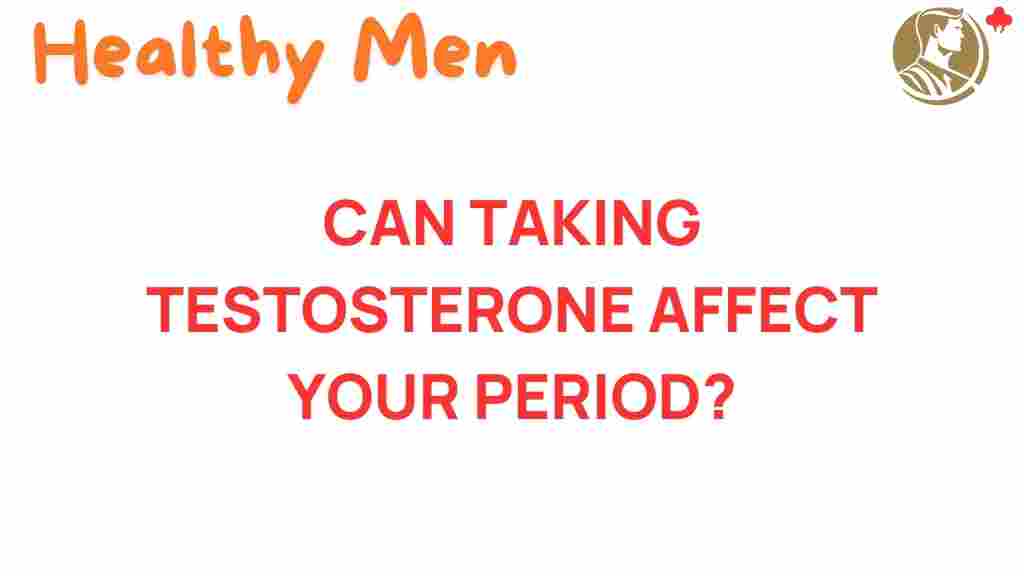The Surprising Impact of Testosterone on Your Menstrual Cycle
When we think about hormones and women’s health, estrogen and progesterone often take center stage. However, testosterone, commonly associated with male health, plays a significant role in the hormonal balance of women as well. This article delves into the surprising impact of testosterone on your menstrual cycle, shedding light on its effects on periods, fertility, and overall health awareness.
Understanding Testosterone in Women’s Health
Testosterone is often misunderstood. While it is predominantly seen as a male hormone, women also produce testosterone in their ovaries, adrenal glands, and peripheral tissues. It is crucial for a variety of bodily functions, including:
- Maintaining muscle mass
- Regulating libido and sexual function
- Promoting bone density
- Influencing mood and cognitive function
In women, testosterone levels are significantly lower than in men, but they are essential for maintaining hormonal balance. Fluctuations in testosterone can impact the menstrual cycle, fertility, and overall well-being.
The Role of Testosterone in the Menstrual Cycle
The menstrual cycle is a complex interplay of hormones, primarily involving estrogen and progesterone. However, testosterone also plays a pivotal role in this process. Here’s how:
- Follicular Phase: During the first half of the menstrual cycle, testosterone helps stimulate the growth of ovarian follicles. These follicles are crucial as they eventually release an egg during ovulation.
- Ovulation: Testosterone levels peak around ovulation, which can enhance libido and sexual desire. This physiological response is nature’s way of promoting fertility.
- Luteal Phase: After ovulation, testosterone levels decline, which, along with progesterone, prepares the body for a potential pregnancy. If pregnancy does not occur, hormone levels drop, leading to menstruation.
Understanding these phases can help women recognize how testosterone influences their menstrual cycle and overall reproductive health.
Testosterone and Hormonal Balance
Maintaining hormonal balance is vital for women’s health. An imbalance, particularly with testosterone, can lead to various symptoms and conditions, including:
- Irregular periods
- Difficulty conceiving
- Polycystic Ovary Syndrome (PCOS)
- Excessive hair growth (hirsutism)
- Acne and oily skin
Women with conditions like PCOS often experience elevated testosterone levels, which can disrupt their menstrual cycle and fertility. Managing these hormone levels is essential for restoring balance and improving health outcomes.
Effects of Low Testosterone Levels
Low testosterone levels in women can also lead to several issues, impacting their menstrual cycle and overall health:
- Reduced Libido: Low testosterone can lead to decreased sexual desire.
- Fatigue: Women may experience increased fatigue and lack of motivation.
- Weight Gain: An imbalance in hormones can contribute to weight gain and difficulty losing weight.
- Bone Health: Low testosterone levels can negatively impact bone density, increasing the risk of osteoporosis.
Recognizing these symptoms is crucial for women to seek medical advice and explore treatment options.
Testosterone and Fertility
Fertility is often a primary concern for women, and testosterone plays a vital role in this area. Here’s how testosterone levels can influence fertility:
- Ovulation: Adequate testosterone levels are necessary for regular ovulation. Irregular ovulation can lead to difficulties in conceiving.
- Egg Quality: Testosterone may also influence the quality of the eggs produced, which is crucial for successful fertilization.
Women facing challenges with fertility should consider discussing their testosterone levels with a healthcare provider. Balancing testosterone may enhance fertility outcomes.
Testing and Measuring Testosterone Levels
If you suspect your testosterone levels may be impacting your menstrual cycle or overall health, it’s essential to have them tested. Here’s a step-by-step process to understand your hormonal levels:
- Consult a Healthcare Provider: Schedule an appointment with a healthcare professional who specializes in endocrinology or women’s health.
- Discuss Symptoms: Be open about your symptoms, menstrual irregularities, and any concerns regarding fertility.
- Blood Test: Request a blood test to measure your testosterone levels, along with other hormones such as estrogen, progesterone, and luteinizing hormone (LH).
- Review Results: Discuss the results with your healthcare provider and understand how they relate to your health and menstrual cycle.
- Explore Treatment Options: If imbalances are found, consider treatment options, which may include lifestyle changes, medications, or hormone therapy.
Potential Side Effects of Testosterone Therapy
While testosterone therapy can be beneficial for women with low levels, it’s essential to be aware of potential side effects:
- Acne and oily skin
- Increased body hair growth
- Voice deepening
- Menstrual irregularities
- Increased risk of cardiovascular issues
Discussing these risks with a healthcare provider is crucial to ensure that the benefits outweigh the potential side effects.
Health Awareness and Lifestyle Changes
Understanding the role of testosterone in the menstrual cycle is vital for women’s health awareness. Here are some lifestyle changes that can help maintain hormonal balance:
- Balanced Diet: Eating a diet rich in whole foods, healthy fats, and lean proteins can support hormonal health.
- Regular Exercise: Engaging in regular physical activity can help regulate hormones and improve overall well-being.
- Stress Management: Practicing stress-reducing techniques such as yoga, meditation, or deep breathing can help balance hormones.
- Sufficient Sleep: Prioritizing sleep is essential, as inadequate rest can disrupt hormone production.
For more information on women’s health and hormonal balance, you can visit this resource.
Conclusion
Testosterone plays a surprising yet significant role in the menstrual cycle and overall women’s health. Understanding its impact can empower women to take charge of their hormonal balance, fertility, and menstrual health. If you suspect that testosterone levels are affecting your health, don’t hesitate to consult a healthcare provider specializing in endocrinology. By being proactive and informed, you can optimize your health and well-being.
For further insights into hormonal health and management, check out this article.
This article is in the category Conditions and created by healthymen Team
